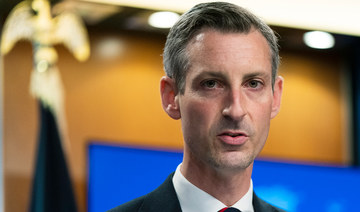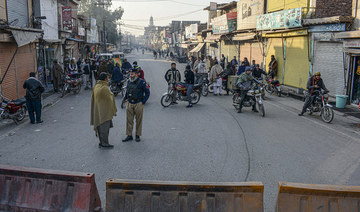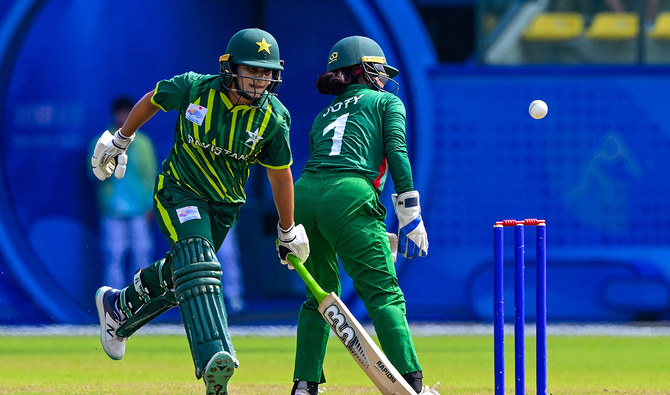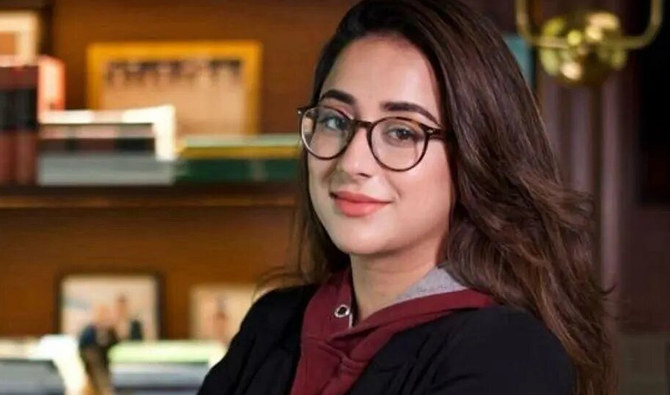BANNU/MARDAN: Pakistani Defense Minister Khawaja Asif said on Tuesday all militants who had seized a counterterrorism interrogation center two days ago had been eliminated in an operation to retake the facility in which two military commandos had been killed and at least 15 were wounded.
The counterterrorism department [CTD] facility was seized on Sunday by Pakistani Taliban (TTP) militants who overpowered guards, seized arms and took hostages. On Monday, a spokesperson for the provincial Khyber Pakhtunkhwa government said authorities had opened talks with militants inside the CTD center but an operation to take back the facility, located in a military cantonment, was launched early on Tuesday afternoon.
Speaking on the floor of the National Assembly, Defense Minister Asif said the operation was launched by the Pakistan Army’s Special Service Group (SSG).
“Ten to fifteen of our SSG commandos, including one officer, were injured. Besides this, there have been two martyrdoms. And all hostages have been freed,” he said. “All terrorists have been killed in this operation and today the whole compound of CTD was cleared by 230pm.”
Asif called the hostage situation an “utter failure” of the provincial government of Khyber Pakhtunkhwa and added: “Ultimately our armed forces had to get hostages freed, killed the militants and give sacrifices.”
Releasing its own statement, the TTP said the army had not been able to enter the compound, adding that the group would release more details later.
A statement from the army’s media wing, ISPR, said the operation “is going to be completed soon.”
Earlier, an interior ministry official for the provincial government of Khyber Pakhtunkhwa had confirmed to Arab News that the operation had been completed.
“Job is done,” Babar Khan Swati, an adviser at the KP home department said. “The operation has been completed and all terrorists have been eliminated,” he added, declining to share figures of those killed and wounded.
A senior military official who declined to be named said the “fight is over but the clearing operation is still ongoing.”
Video footage shared by an Arab News witness in the early afternoon showed plumes of smoke rising from the vicinity of the Bannu military cantonment. Residents reported hearing firing and loud explosions.
The government announced a “medical emergency” at hospitals in Bannu city, while schools and other educational facilities remained closed on Tuesday. Barricades were placed on all roads leading up to the military cantonment and the area was completely sealed off to the public and media. The Internet has been shut down for at least two days in the city.
Residents Arab News spoke with expressed fear over the standoff.
Noor Aslam, village secretary of the union council Mombati Barakzai, said life had come to a standstill in the city.
“Due to mobile phones, all business here has stopped,” he said. “We can’t meet anyone or speak to them.”
“We don’t know when this situation will end,” he said. “I only know that people are worried.”
“DON’T SURRENDER BEFORE THE ENEMY”
In a statement released on Monday, the TTP said detainees linked to the group had taken “several military officers and jail staff” hostage at the CTD facility. The group demanded safe passage for its members to Pakistan’s tribal regions of North and South Waziristan.
In a video statement released on Tuesday, TTP chief Mufti Noor Wali Mehsud advised militants inside the CTD center not to “surrender before the enemy under any circumstances.”
“Once (you) have shown honor, sacrifice your life but don’t dishonor the fighters in front of the enemy,” he said in his message. “They [Pakistan government and military] have always deceived us in and out of the jails, [and] have broken their pledge so don’t be deceived by them.”
The TTP, which has stepped up attacks since it announced the end of an Afghan Taliban-brokered cease-fire with the government last month, has long used violence in a bid to take over Pakistan and enforce its own harsh brand of Islam.
The TTP’s siege of the CTD center on Sunday came on the same day four Pakistani police officers were killed and another four critically wounded when suspected militants attacked a police station in Lakki Marwat district in the country’s northwest.
On Monday, a suicide bombing killed at least two passersby and a soldier in the northwestern region of North Waziristan. On Tuesday, the TTP said in a statement it had attacked a police station in Wana city in South Waziristan and killed two policemen and captured weapons but police said only one officer had been wounded.
- Rehmat Mehsud contributed reporting from Peshawar.




















